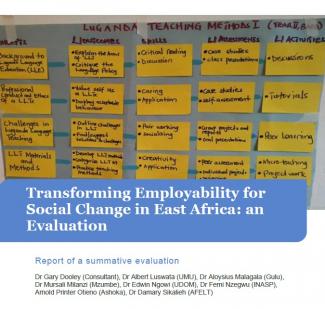
Transforming Employability for Social Change in East Africa: an Evaluation
Download publication files
Transforming Employability for Social Change in East Africa (TESCEA) is a Foreign, Commonwealth and Development Office (FCDO)-funded initiative, part of FCDO’s Strategic Partnerships for Higher Education Innovation and Reform (SPHEIR) programme. With partners in Tanzania, Uganda and Kenya, TESCEA is designed to support universities to create a learner-centred experience for students. This improved learning experience has at its core critical thinking, problem-solving and gender-responsiveness pedagogy; and allows for practical learning beyond the classroom to improve a graduate’s employability. See the project page here.
Between March 2020 and January 2021, an evaluation of TESCEA was conducted. The overall purpose of this evaluation was to assess the state and quality of the outcomes that TESCEA was designed to achieve and the value of the approach. This was explored by reviewing evidence and providing learning about its effectiveness, sustainability, equity, value for money, learning and adaptation.
The evaluation was fully participatory, utilisation-focused, co-designed and co-implemented with the primary users (Mzumbe, UDOM, Gulu, UMU, AFELT, Ashoka East Africa, INASP). A core evaluation team comprised of these key stakeholders was engaged from the start in a collaborative process and oversaw the design and implementation of the evaluation. An external evaluation/data analyst oversaw the analysis of the data and the interpretation of the findings. The evaluation used a multi-method approach, drawing on a variety of sources for its data, including:
- Document review
- Qualitative feedback from teachers, students, senior management and Joint Advisory Group (JAG) members
- Baseline and follow-up surveys of teachers and students
The evaluation findings suggest that overall TESCEA has been successful in achieving its outcomes and outputs and has delivered its activities economically and efficiently and has thereby contributed to transforming the way universities teach and learn through a focus on critical thinking, problem-solving and gender-responsive pedagogy.
